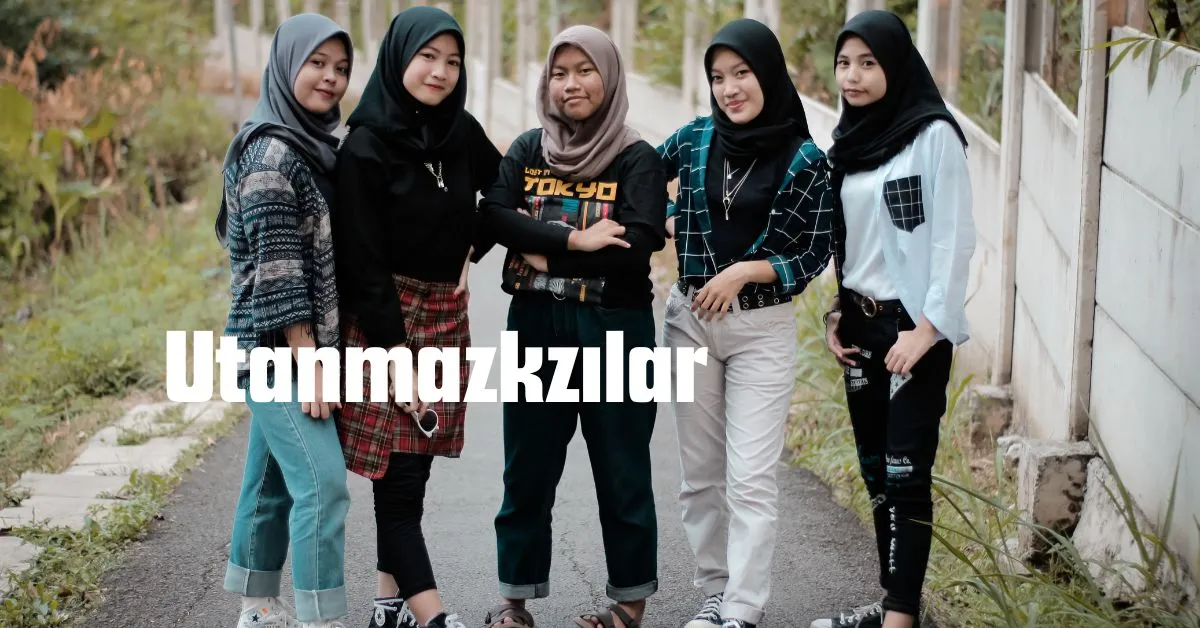If you spend enough time on TikTok, Instagram, or X (formerly Twitter), you’ve probably come across the term “Utanmazkzılar.” At first glance, it sounds sharp — even controversial — but that’s exactly why it caught fire in online spaces. The word, rooted in Turkish slang, literally translates to “shameless girls.” Yet, like so many expressions born on the internet, its meaning has evolved far beyond its literal translation.
Today, Utanmazkzılar is not just a phrase — it’s a digital identity, a cultural movement, and in many ways, a symbol of empowerment wrapped in humor. This article dives deep into what Utanmazkzılar means, how it rose to prominence, why people embrace it, and what it tells us about modern online culture, identity, and language.
What Does Utanmazkzılar Mean?
To understand Utanmazkzılar, we need to unpack its roots. The word combines two Turkish elements:
- Utanmaz – meaning “shameless” or “unashamed.”
- Kızlar – meaning “girls.”
Literally, it translates to “shameless girls.” But context is everything — and in digital culture, context evolves faster than ever.
Originally used as a term of criticism, Utanmazkzılar began to shift meaning in online communities. What was once meant as an insult transformed into a playful expression of confidence and authenticity. It’s now used by creators and users — often women — who embrace being bold, outspoken, and unapologetically themselves.
The best part? It’s no longer about shame at all. It’s about shaking off the judgment that comes with self-expression, humor, and individuality.
The Rise of Utanmazkzılar in Digital Culture
From Slang to Social Symbol
Social media has the power to take a local phrase and turn it into a global identity — and that’s exactly what happened with Utanmazkzılar. The word first started trending within Turkish-speaking communities on platforms like Instagram and TikTok. Users began using it as a hashtag for humorous videos, memes, and commentary about modern life.
Before long, the term took on new life: it became a badge of pride for those who didn’t want to conform. What started as slang evolved into a kind of digital rebellion — a way to say, “I’m confident, I’m expressive, and I don’t care who disapproves.”
Why It Caught Fire Online
Here’s why Utanmazkzılar spread so fast:
- Humor and relatability – People love witty self-irony.
- Cultural reclamation – Turning a negative word into a symbol of empowerment.
- Viral aesthetics – It looks catchy and visually strong as a hashtag.
- Community spirit – It connects users through humor, confidence, and shared experiences.
Online, language evolves collectively. The phrase found new meaning not through dictionaries, but through thousands of voices using it creatively.
Utanmazkzılar as an Empowerment Movement
You might be wondering: How can a word meaning “shameless girls” be empowering?
The answer lies in reclamation. Throughout history, marginalized groups have taken derogatory labels and turned them into sources of pride — think of how “nerd,” “queer,” or “bossy” have been redefined. Utanmazkzılar follows that same linguistic pattern.
By embracing the term, users are rejecting social rules that dictate what’s “acceptable” for women to do, wear, or say. The term now symbolizes:
- Confidence over conformity.
- Expression over expectation.
- Playfulness over perfection.
In other words, being “shameless” isn’t about lacking morals — it’s about refusing to be shamed for being yourself.
Cultural and Gender Context
Challenging Double Standards
In many societies, including Turkish culture, women are often expected to behave modestly or within traditional boundaries. Being labeled as “shameless” historically carried social stigma. Online, however, younger generations are flipping that narrative.
By calling themselves Utanmazkzılar — sometimes humorously, sometimes proudly — women are reclaiming control over their identity. They are saying, “If confidence and freedom make me shameless, so be it.”
It’s humor with a message — and that mix of irony and self-assurance is what makes it so powerful.
A Global Pattern
This isn’t unique to Turkey. Across cultures, language reclamation is a global phenomenon:
- English speakers turned “bad b*tch” into a compliment.
- Korean pop culture celebrates the “girl crush” concept.
- Latin creators embrace “sin vergüenza” (without shame) as empowerment.
Utanmazkzılar is part of this universal trend — where humor, irony, and identity intersect to challenge stereotypes.
The Role of Social Media in Popularizing Utanmazkzılar
Social media platforms are linguistic laboratories — where new words, trends, and identities are born every day. In the case of Utanmazkzılar, several factors fueled its rise:
- Hashtags and Visibility
Creators used #Utanmazkzılar to tag comedic videos, aesthetic photos, and confidence-driven content. The repetition turned it into a recognizable digital tag. - Viral Audio and Memes
Popular TikTok sounds and remix trends helped the phrase spread beyond language barriers, letting humor do the translating. - Influencers and Micro-Communities
Influencers adopted the term as part of their personal branding — using it to express boldness or poke fun at double standards. - Cross-Platform Adaptation
From Reddit threads to YouTube shorts, the word traveled across platforms, morphing with each new audience.
Essentially, Utanmazkzılar became a community signal — a digital wink that says, “I get the joke, and I’m part of this tribe.”
Utanmazkzılar in Pop Culture and Creative Media
Beyond social media, Utanmazkzılar has started to appear in entertainment and marketing.
- Comedy sketches and reels use it to satirize social expectations.
- Fashion influencers tag it under bold outfit posts.
- Music creators reference it in lyrics or captions to express confidence and attitude.
Its edgy tone gives creators a tool to blend humor with commentary — the secret recipe for viral content.
Even brands are catching on. Youth-oriented fashion and lifestyle companies sometimes reference Utanmazkzılar or similar slang to appear relatable, edgy, and culturally aware.
It’s proof that slang isn’t just casual language — it’s a branding tool, a community connector, and a mirror of modern values.
The Humor Behind the Word
A big part of Utanmazkzılar’s success lies in its humor. On the surface, it’s playful and ironic. But underneath, it reveals a truth about how people express themselves online.
In many memes and posts, the term is used sarcastically:
- A woman posting a bold photo might caption it, “Yes, I’m one of the Utanmazkzılar.”
- A meme mocking judgmental comments might use the word ironically to flip the meaning.
This type of humor does more than entertain — it builds solidarity. It reminds users that it’s okay to laugh at outdated norms and to celebrate the courage to be yourself.
Cultural Sensitivity and Responsible Use
While the online meaning of Utanmazkzılar is lighthearted and empowering, it’s still important to handle it thoughtfully. Not everyone interprets the term the same way. Some might still see it through its older, judgmental lens.
If you’re using or referencing it, keep these tips in mind:
- Understand the context – Know your audience and cultural background.
- Use it positively – Celebrate confidence, don’t mock others.
- Avoid stereotyping – Humor works best when it uplifts, not when it reinforces bias.
Language evolves, but awareness ensures it does so respectfully.
The Globalization of Local Slang
Utanmazkzılar is part of a fascinating global shift — where local languages go viral. From Japanese “kawaii” to Spanish “chido,” slang once limited to small regions now reaches millions worldwide through algorithms and memes.
This globalization of slang reflects:
- The power of short-form video culture.
- The blending of local and global youth trends.
- The way humor transcends linguistic barriers.
What’s beautiful about this is that Utanmazkzılar carries its Turkish roots proudly while resonating with universal emotions: humor, rebellion, and authenticity.
The Future of Utanmazkzılar
Will Utanmazkzılar fade like a passing meme, or evolve into a lasting cultural reference?
That depends on how the community continues to shape it. Its flexibility — part humor, part empowerment — gives it staying power.
Possible future directions include:
- Cultural branding – small businesses or artists using it as part of their identity.
- Feminist discourse – writers and activists exploring it in discussions about gender and language.
- Internet history – being cited as a case study in linguistic evolution.
No matter where it goes next, Utanmazkzılar will remain a reminder of how humor and language can redefine social boundaries.
Conclusion:
At its heart, Utanmazkzılar is more than a viral word. It’s a reflection of how digital culture transforms language — and how humor can reclaim power from judgment.
What began as a phrase rooted in shame has become a celebration of confidence, creativity, and identity. It’s a digital revolution hidden behind a playful word — reminding us that language isn’t fixed, and neither are we.
So, whether you use Utanmazkzılar as a hashtag, a joke, or a proud statement — remember, it’s about owning who you are, without apology.
FAQs
1. What does Utanmazkzılar literally mean?
It literally means “shameless girls” in Turkish, combining “utanmaz” (shameless) and “kızlar” (girls). Online, it’s often used humorously or proudly, not as an insult.
2. Is Utanmazkzılar offensive?
It depends on context. In casual online culture, it’s usually playful and empowering. However, in traditional settings, it can still sound bold or provocative.
3. Why is Utanmazkzılar popular on TikTok and Instagram?
Because it’s catchy, funny, and relatable. Users adopt it for memes, captions, and self-expression that celebrates confidence and irony.
4. Can men use the term Utanmazkzılar?
While the word refers to “girls,” men sometimes use it jokingly in memes or commentary — often as part of humorous, community-driven trends.
5. How can brands use Utanmazkzılar responsibly?
Brands should understand its cultural context and tone. When used authentically — for example, in youth marketing or satire — it can resonate strongly.

